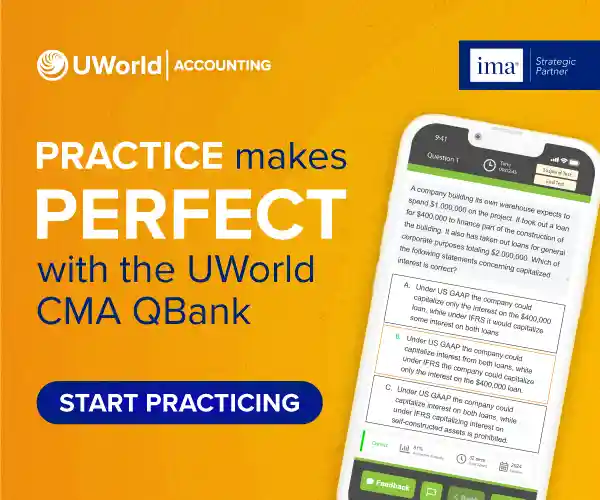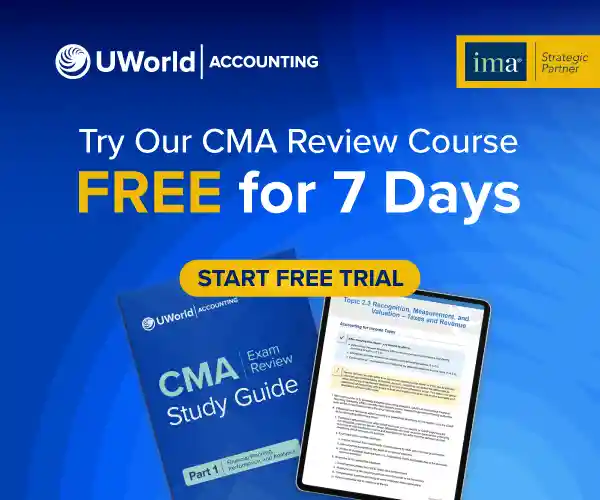The 2-part CMA exam evaluates your understanding of various management accounting competencies, from theoretical to practical application. The 2 exam parts include:
- Part 1: Financial Planning, Performance, and Analytics
- Part 2: Strategic Financial Management
You can take either part first, but you must pass both Part 1 and Part 2 within 3 years of enrolling in the CMA Program. Selecting which part to sit for first is a personal decision that should consider your current university course load or job responsibilities.
If you are working in corporate finance, for example, you may want to register for Part 2 first. If you’ve recently taken intermediate accounting, sitting for Part 1 while core concepts are fresh in your mind may be the right choice for you.
Each exam part covers a comprehensive list of topics aligned with what today’s corporate finance and accounting professionals need to succeed on the job.
Here’s a brief overview of how knowledge and practical skills are evaluated on each part of the CMA exam as per Institute of Management Accountants (IMA) in its Content Specification Outline:
| Knowledge | Ability to retain learned material, such as facts, criteria, techniques, principles, and procedures |
| Comprehension | Ability to grasp and interpret the meaning of material |
| Application | Ability to use learned material in new and concrete situations |
| Analysis | Ability to break down material into its parts to understand its organizational structure |
| Synthesis | Ability to assemble parts to form a whole or proposed set of operations; ability to relate ideas and formulate hypotheses |
| Evaluation | Ability to judge material value for a given purpose based on consistency, logical accuracy, and comparison to standards, along with appraising judgments for selecting a course of action |
Each topic on the exam is categorized into 1 of the following skill levels:
| Level A | Skill levels of knowledge and comprehension |
| Level B | Skill levels of knowledge, comprehension, application, and analysis |
| Level C | Requiring all 6 skill levels — knowledge, comprehension, application, analysis, synthesis, and evaluation |
Part 1: Financial Planning, Performance, and Analytics
Part 1 of the CMA exam focuses extensively on 6 topics related to management accounting fundamentals. With a pass rate between 45% and 50%, it is important to know what to focus on and the weightage of each topic.
Here’s an overview of the topics and sub-topics covered on the Part 1 CMA exam:
| Part 1: Financial Planning, Performance and Analytics | ||
|---|---|---|
| Topic | Weightage and Skill Level | Sub-topics |
| External Financial Reporting Decisions | 15% — Levels A, B, and C |
|
| Planning, Budgeting, and Forecasting | 20% — Levels A, B, and C |
|
| Performance Management | 20% — Levels A, B, and C |
|
| Cost Management | 15% — Levels A, B, and C |
|
| Internal Controls | 15% — Levels A, B, and C |
|
| Technology and Analytics | 15% — Levels A, B, and C |
|
Part 2: Strategic Financial Management
The second part of the CMA exam focuses on financial decision-making and is more application-based. Here’s an overview of the topics and sub-topics covered in the Part 2 CMA exam:
| Part 2: Strategic Financial Management | ||
|---|---|---|
| Topic | Weightage and Skill Level | Sub-topics |
| Financial Statement Analysis | 20% — Levels A, B, and C |
|
| Corporate Finance | 20% — Levels A, B, and C |
|
| Business Decision Analysis | 25% — Levels A, B, and C |
|
| Enterprise Risk Management | 10% — Levels A, B, and C |
|
| Capital Investment Decisions | 10% — Levels A, B, and C |
|
| Professional Ethics | 15% — Levels A, B, and C |
|
Exam Format
The CMA exam consists of 100 multiple-choice questions (MCQs) and two 30-minute essay questions in each part that you must answer within 4 hours. You can take the CMA exam globally at Prometric centers or online via remote proctoring.
- 100 multiple-choice questions (3 hours)
- Two 30-minute essay questions (1 hour)
The essay questions will be presented after completion of the multiple-choice questions. To take the essay questions, you must answer at least 50% of multiple-choice questions correctly. Remember, you cannot return to the multiple-choice questions after entering the essay section.
While the MCQs are graded by computer, essays are manually graded by practicing CMAs. It may take up to 6 weeks after the close of your exam window to receive your official score, posted on your CMA candidate profile via IMA’s website.
How to Prepare for the CMA Exam Parts
Experts estimate that you need 150-170 hours of study time for each part of the CMA exam. Here’s how you can prepare:
Create a Study Plan
Create a study plan that works for you and accommodates your schedule. UWorld’s CMA Review course offers a Dynamic Study Planner that provides a personalized roadmap to your success. All you have to do is input your start and end dates and available study hours and our algorithm will create an optimized study plan. Should life happen and you miss a task or a full day studying, the calendar will adapt to keep you on course.
Leverage High-Quality Study Materials
Find study materials and review courses that match your learning style. You might consider a CMA Review Course that provides access to a comprehensive QBank, study guides, flashcards, and interactive tools that enhance retention and understanding. Taking practice tests can help you understand areas that need improvement so you can focus on mastering them and passing both parts of the CMA exam.






